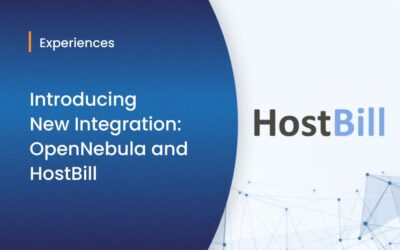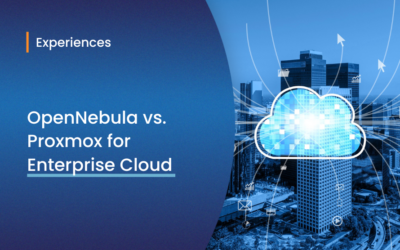BIT is a business to business internet service provider in the Netherlands specialized in colocation and managed hosting. BIT delivers to quality aware customers the backbone of their IT and internet infrastructure. Reliability is the focus of BIT’s services. BIT differentiates through its knowledge, years of experience and pragmatic solutions. It helps that all people of BIT share a passion for technology.
We wanted to have a Cloud Management Platform (CMP) that would be easy to manage and would not cost too much of our resources to keep up-to-date. It should also be easy to in-corporate in our infrastructure, be flexible and easy to adjust to our needs. As we’re an ISP operating our own infrastructure we were looking for software that was able to build a “virtual DataCenter”, more functionality then “just” be able to provision a bunch of resources. We have done internet research on some main CMP’s: OpenStack, Eucalyptus, oVirt, OpenNebula. Two of them were tested in a lab environment: OpenStack and OpenNebula. We had lots of trouble getting OpenStack working, hit some bugs, etc. In the end we could never get it to do what we wanted. It became clear the project is moving fast, at least code was flying around, subprojects became different entities of themselves, etc. We were worried it would take a lot of time to get it all running, let alone upgrade to newer versions.
OpenNebula worked pretty much out of the box, besides a bug with OpenvSwitch that stood in the way at first. We wanted to have a platform that would be able to work with different hypervisors. We’re using KVM now, but for one reason or the other VMware, XEN, or Hyper-V should be possible. We didn’t want to restrict ourselves to only one (that’s why oVirt didn’t make it). Besides that it should be easy to understand how things are tied together, basically KISS. If systems get overly complex sooner or later you get bitten by them. You don’t have complete oversight of every little component and when the shit hits the fan you don’t know were to start cleaning …
OpenNebula core itself might be pretty complex but most of the work is being done by drivers. Drivers that are most of the time easy to understand shell script doing stuff. Using commands that sysadmins are already familiar with, and therefore aren’t scary, and easy to debug. OpenNebula has quite a bit of interfaces. A nice WebGUI always helps to get familiar with a project. If you can just “click” something together that actually works it’s pretty impressive. But the OCCI interface and XML-API are really useful to enable integration with our workflow and administrative systems, especially with the nifty “hooks” feature.
OSS to us is more that just “free to use” software, although the liberal license makes it easy to just “start using” without the need to worry about all kind of licensing issues. It gives you the possibility to, if needed, make your own adjustments and fit your use case. OpenNebula is flexible enough to extend without the need for “hacking the source”. Although it’s possible it’s (most of the time) not needed, which is a big plus because it makes following “upstream” easy. But OSS by itself is not enough for a project to be successful and succeed. It’s about the way the software is developed that is of vital importance. The OpenNebula way of developing software is open, and user focused, The “voice” of the community really matters. The cliche “software made with and for the community” really applies here. If users get (positive) feedback about their input they feel appreciated and be more “connected” to the project. The “atmosphere” on the mailing list is friendly and open. No flame wars, or negativism here, so it keeps users “in” instead of pushing them away.
In a nutshell, the benefits of using OpenNebula are:
- Simple but powerful / flexible
- Works out of the box
- Easy to maintain / upgrade
- (API) Interface(s)
- OSS
- Great community / development organization (that became obvious as soon as we joined the mailing list)
And the benefits of using OSS:
- Source available (i.e. able to audit code, adjust code, etc)
- Be able to influence the (feature) roadmap by joining the community
- Quicker development (more potential developers)
- OSS models most of the time have an easy way to communicate with developers. With (big) commercial organizations this is often not possible or very difficult. It’s all about technical excellence, not about profit.






What bug in openvswitch were you htting? Was it the bug were the vlantag was not reapplied after resuming?
@Rogier: No, we started testing with OpenNebula version 3.8 on Ubuntu 12.10. It
turned out that legacy bridging support in OpenvSwitch had been removed.
See http://dev.opennebula.org/issues/1688. It was fixed in OpenNebula
4.0.